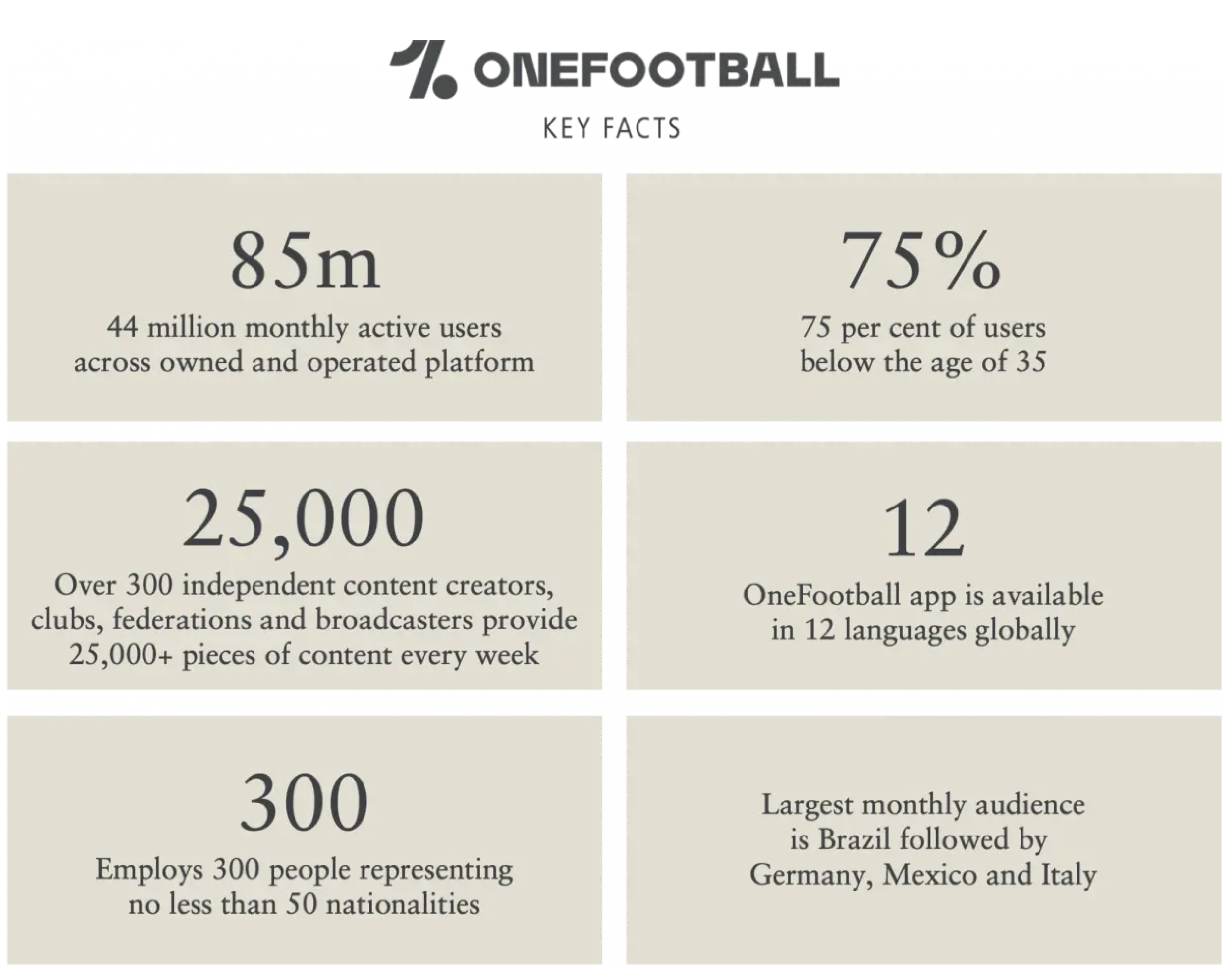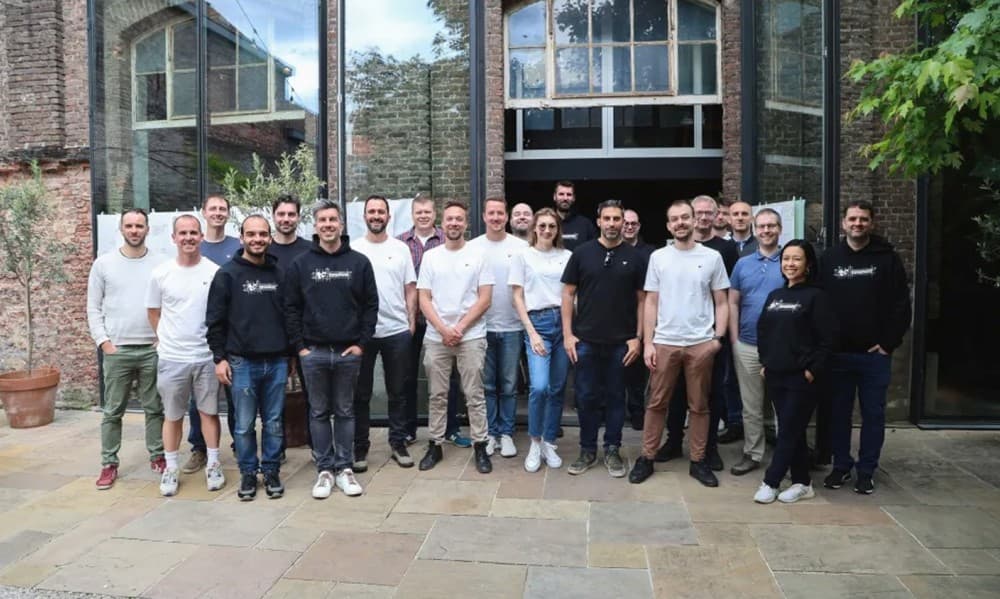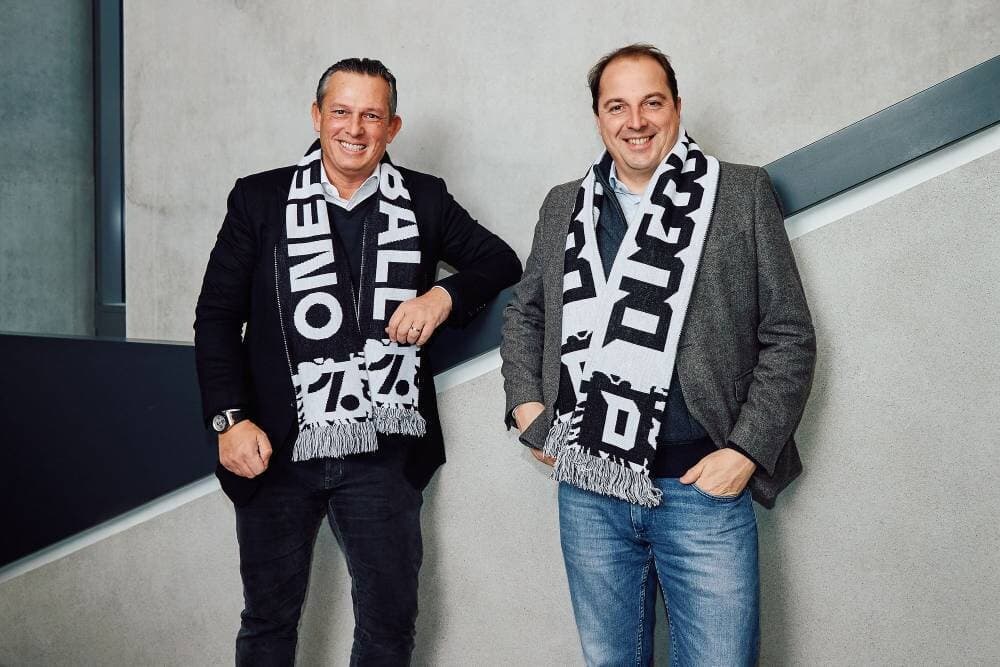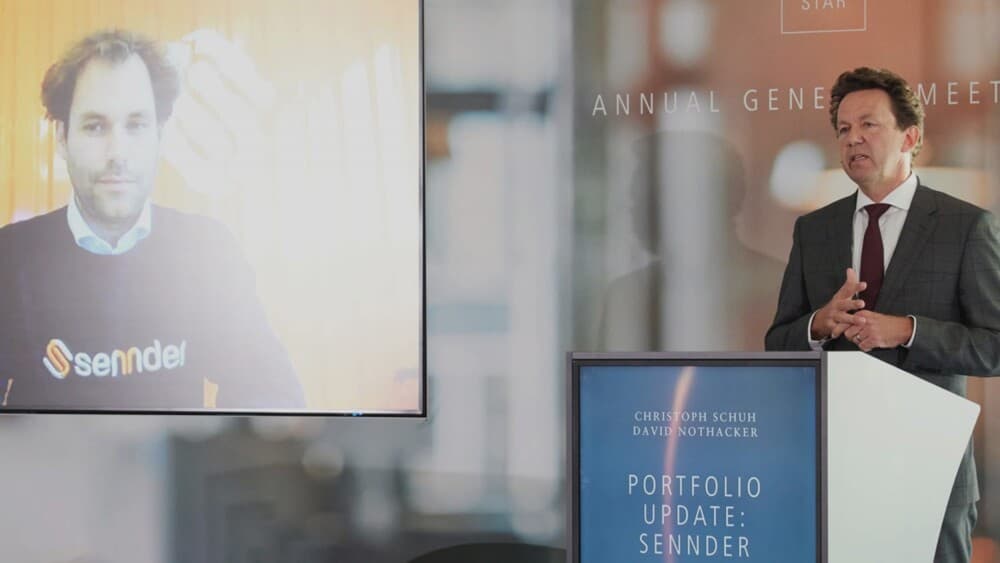Founders' Stories|
Serving football fans with the most relevant and comprehensive content globally
In Football, as in business, hardship and perseverance are a driver of success. Today, OneFootball is unparalleled when it comes to everything football, both on and off the pitch, serving football fans with the most relevant and comprehensive content globally. Learn more about the early days of OneFootball and how founder and CEO Lucas von Cranach built one of the top 1000 apps worldwide.
A CONVERSATION WITH LUCAS VON CRANACH, FOUNDER & CEO, ONEFOOTBALL
It is no exaggeration to say that Lucas von Cranach was always destined to play a role in the football business. By his own admission, he is a crazy football fan: ‘Football has always played a big role in my life. I played throughout my whole youth and I never missed a match of my favourite team FC Cologne. I even played for the club in my early days.’
But there was a problem for fans like him: it was very difficult to get access to football data on mobile devices in the pre-smartphone era. As a result, he started an SMS service which gave users the live results of their favourite team they had subscribed to – FC Cologne in his case. However, since Cologne was not a very successful team, the service became relatively expensive for the user: if Cologne lost 0-5, he had to pay for an SMS for every goal. Also, the user experience needed to be improved.
The arrival of smartphones in 2008 brought mobile apps for a range of devices such as Symbian and Blackberry. But using them to distribute football data was complex because an app had to be built for every device. So when the former CEO of Apple for Europe, the Middle East and Africa asked him to create an app for the iPhone, Lucas agreed to do it. Apple was the leading provider of mobile apps at that time and OneFootball was among the first thousand apps in the Apple App Store globally in 2009.
Lucas knew that the distribution of his data service to fans had to be either via an app or a website. He decided to go for the app, because it is customisable: every user can customise the contents of apps, which isn’t the case with websites.
His second decision was to focus only on football, not sports in general. Basketball is a completely different sport to handball, tennis, golf or football. Every sport produces different data and requires different forms of presentation.
His third decision was to go for a platform approach, because in the long run it would be very difficult for publishers of non-exclusive content to compete with one focused on exclusive content. With a non-exclusive model, a publisher must create much more content which requires hiring many more producers, making it hard to find economies of scale.
The idea has always been to serve football fans with the most relevant and comprehensive content globally via an app, and only football.
So OneFootball was launched as a football-only app, and it was doing quite well – except that it was constantly fighting insolvency in its first five years of existence. Lucas realised that European investors did not understand why spending money to build a platform that aggregated content was essential to grow a user base. ‘They thought that the priority was to generate profits and build a team. But creating platforms is not about generating large revenues: at first, it is about attracting engaged users with the best product and grow the user base. Then, this large user base puts you in the position to monetise the customer via advertising and/or a direct-to-consumer approach.’ Lucas clearly believes that ‘Money always follows the best user experiences.’
‘When I went to the US to raise capital for OneFootball there, I found that US investors would not invest in the company because they did not understand the sport – which they call ‘soccer’ – as well as we do in Europe. So, again, every month I struggled to survive financially, even though we had two million customers using our app on a monthly basis at that time. Companies like Huffington Post, Buzzfeed, Vice and others were on the rise and US investors were attracted by the large number of “customers” these companies were reporting.
‘But in reality they were not real customers, because the companies were distributing their content via social media and were not engaging with them directly. They were followers or subscribers on social media platforms and the big majority were not active. Yet VCs and investors were more focused on these companies. OneFootball’s real engaged customer base looked small in comparison with these numbers, which made it very hard to compete for investment.’

The company's Berlin headquarter
Eventually Lucas met up with Union Square Ventures, a US VC which was one of the first investors in Twitter, Tumbler and FourSquare, and with Earlybird, a European investor which was invested in Wunderlist, EyeEm and others. They understood platform businesses that aggregate content and provide great user experiences, knew the value of engaged users, and the need to spend funding to attract and lead them to the product. It took five years to finally complete the Series A and get institutional money on board, even though the user numbers were constantly increasing and the customers were very engaged and loyal to OneFootball.
‘More really good investors came on board,’ says Lucas. ‘Lakestar joined us in 2014, alongside Adidas, Creative Artist Agency, TPG Growth and Philipp Schindler from Google. These were smart venture capital investors who could help me and help the business. And we went on investing 95 per cent of our resources on attracting impressive numbers of engaged users. Today, we have 11 million monthly active users in our app alone. We are the largest platform globally, with very high user engagement numbers: users come back to the app about 45 times a month using it for 3 minutes on average per session.
Creating platforms is not about generating large revenues: at first, it is about attracting engaged users with the best product.
‘We are building a direct-to-consumer business. Our media platform is completely free, which leads to the engagement of a huge number of users creating the scale needed to pull in advertising dollars. It is about that engaged user base which we need to profile better and not about collecting email addresses as social media does.’
In football, he believes that there are five potential direct-to-consumer revenue streams which could be interesting for building a successful platform that will attract fans to spend their own money in the football ecosystem:
- Over-the-top (OTT) live streaming of football matches;
- Merchandising
- Ticketing
- Betting
- and Travelling
Depending on the country, serious football fans spend between EUR1,000 and EUR3,000 per season on their football clubs. OneFootball does not take betting as a revenue stream given the legal issues, and does not sell physical goods which have to be manufactured and distributed. But it has decided to focus on OTT which is a huge market: digital rights bring in EUR50 billion to EUR75 billion per season, and are very valuable when distributed by a business such as OneFootball that knows its customers’ interests, their favourite clubs and their favourite national teams.
‘We have more than 10 million active monthly users and we decided to ramp up our OTT strategy. We brought in Franz Koch, former CEO of German sportswear giant Puma, as Chief Operating Officer, and Patrick Fischer, previously CEO of leading German broadcaster Sport1 Media, as Chief Business Officer. They are leading a team in charge of our overall business strategy, whose mission it is to build a media platform driving user engagement and customer loyalty, with the OTT business on top
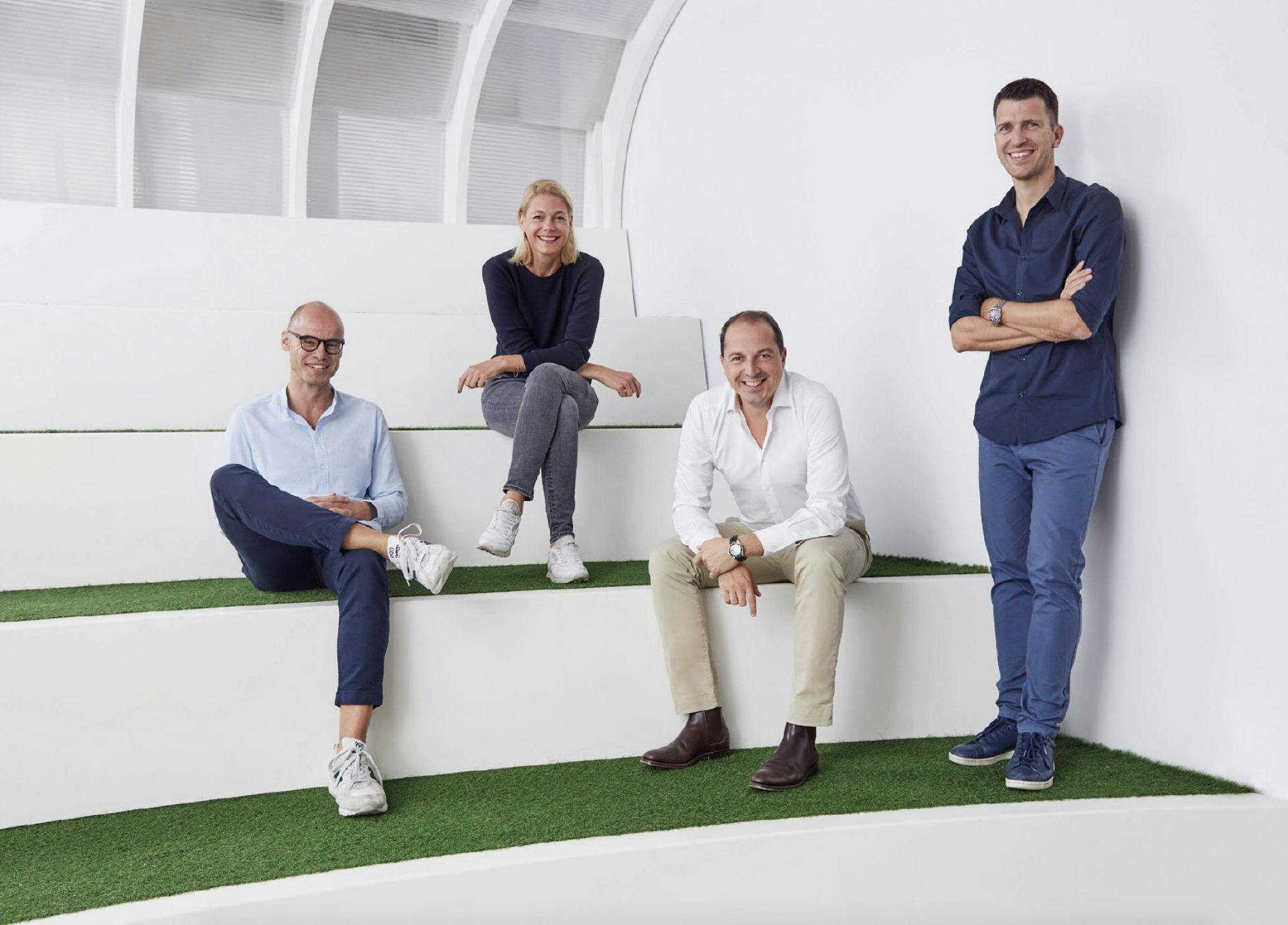
The OneFootball Leadership Team (from left to right): Franz Koch (COO), Silke Kuisle (CFO), Lucas von Cranach (CEO & Founder), Patrick Fischer (CBO)
‘We have managed to convince some rights-holders such as Sky Deutschland, DAZN and Eleven Sports to give us access to their rights so we can make their coverage available in particular markets on a pay-per-view basis. We have also invited some clubs – including the Premier League’s Manchester City and Spain’s Real Madrid – to have a presence on our platform: the clubs’ editorial content is natively embedded in the OneFootball app. On top of that, the original club content is complemented by fan-based blogs which are really popular with die-hard fans.’
Lucas von Cranach sees OneFootball’s future trajectory as a media platform offering aggregated free content organised in a way that engages customers. In fact, it is similar to Twitter, but without user-generated content: only OneFootball is in control of the published content. And, similarly to Spotify, OneFootball democratises the market: younger fans aged below 35, who make up 75 per cent of OneFootball’s user base, have the opportunity, thanks to an affordable pay-per-view model, to see live matches in a flexible and convenient way. ‘We have the largest customer base in football globally, the highest engagement level, a proven model in the platform and the direct-to-consumer OTT business, and an amazing shareholder base. We can truly say that we are disrupting the market. We have become an integral part of the football ecosystem.’
In December 2020, OneFootball acquired Dugout to reshape the football digital media landscape and form the world's largest owned and operated digital football media business. The acquisition saw Arsenal, Barcelona, Bayern Munich, Chelsea, Juventus, Liverpool, Manchester City, Paris Saint-Germain, Real and Olympique de Marseille's join OneFootball as shareholders.
Dugout creates and distributes over 3,500 brand safe, professional videos delivering 400 million views globally a month and growing. The combined business is serving the whole football ecosystem: Clubs, federations, and leagues can increase audience reach and harness powerful data insights to gain a deeper understanding of their fans’ engagement, while brand and advertising partners have access to new, contextually-relevant destinations to reach highly engaged football fans.
